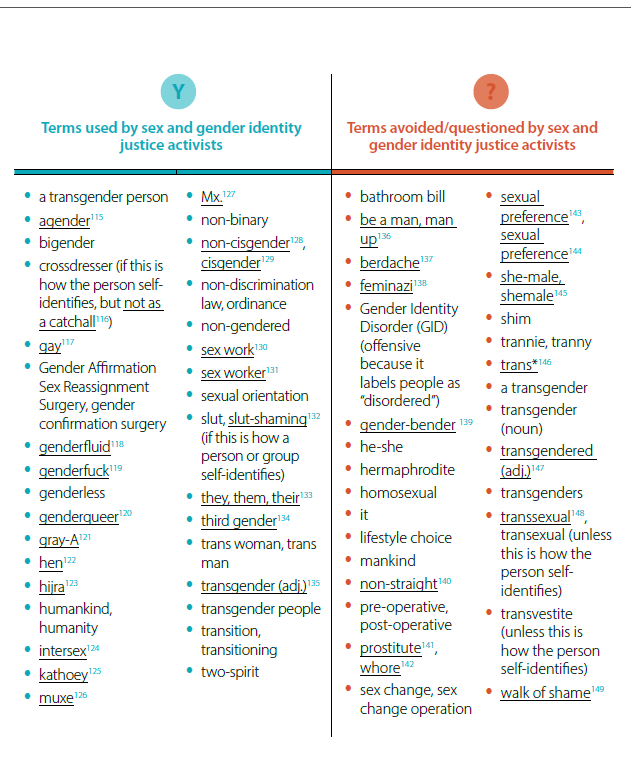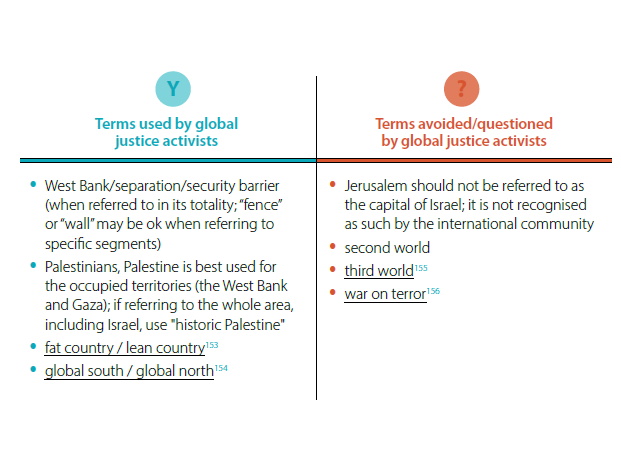
So if a criminal justice department adopts the style guide and language but keeps the exact same practices, that makes a difference for reform somehow?

So if a criminal justice department adopts the style guide and language but keeps the exact same practices, that makes a difference for reform somehow?

I think the new phenomenon is discussed:
Equity-language guides are proliferating among some of the country’s leading institutions, particularly nonprofits. The American Cancer Society has one. So do the American Heart Association, the American Psychological Association, the American Medical Association, the National Recreation and Park Association, the Columbia University School of Professional Studies, and the University of Washington. The words these guides recommend or reject are sometimes exactly the same, justified in nearly identical language. This is because most of the guides draw on the same sources from activist organizations: A Progressive’s Style Guide, the Racial Equity Tools glossary, and a couple of others. The guides also cite one another.
It’s calling out that a handful of sources that are cited in profession specific style guides that have referential loops, and are managed by a small portion of people. Based on the names, of these sources, is the activist nature appropriate for general style guides, or is it a dangerous tool of politicization of language? I identify as a leftist and progressive, but I don’t think partisan orgs with this much influence and questionable methodology should set standards. The Progressive’s Style Guide links websites like this as sources ( which is basically one journalist’s opinion blog post): https://grist.org/climate-energy/how-to-write-about-climate-pull-up-a-barstool/
Or this table from the source. How is “genderfuck” a professionally acceptable term, but “sexual preference” a taboo. Or slut or slut shaming is allowed, but only in certain context? Or we can’t talk about metaphors of spirit animal since that is appropriation, but for gender two spirit is okay to appropriate? How does a lay person navigate this minefield of discourse without a masters degree and staying up on style guide updates?

Or this page on discussing Israel. Personal politics aside, this style guide has an obvious political agenda, right?

Yeah, and we switch back to black because not all black people are African American.

As for the euphemism treadmill aspects, we’ll never outrun that; language and meanings are always changing, and we can’t pretend it doesn’t. We’ll always need to be changing our language with time as language itself evolves if we want to have the same or similar meanings as before.
Yes, but as the author points out.
Although the guides refer to language “evolving,” these changes are a revolution from above. They haven’t emerged organically from the shifting linguistic habits of large numbers of people.
Something has changed recently where the language change has been too top down, and seemingly more about creating pleasant sounding euphemisms that either mean the same thing or obfuscate the meaning to make the term less useful.

How can this be debunked? Didn’t the UN just start their investigation less than a month ago? I didn’t see any conclusions come out.


Did you read the article?

People are being killed at a large scale, the aggressor is pink washing using a what aboutism about those people’s track record on gay rights, and this article doing a what aboutism about israel and the west’s gay rights track record. The headline is about genocide. But the content of the article is just trying to make an argument about which side has the better gay rights track record. I don’t think any body is actually arguing, or believing an israel argument, that this war is justified because israel is supposedly kinder to gay people than palestine.

But this is kind of a criticism of responding to what aboutism with what aboutism. Both sides were historically anti queer in both similar and different ways.

Yeah. I’ll give this kid credit as a high school student writing this. But the premise of pink washing is that it is used to divert attention or sway public opinion. That doesn’t have any bearing on facticity of claims. It is possible to call out pinkwashing by Israel and the West and also call out homophobia in middle east society at the same time.

Do ESG funds yield much? It feels good to read about doing the right thing, but it doesn’t feel good to have investments not pay off that require you to make cuts later. As a personal investor I could never really justify the expense ratios and historical performance for my retirement or investment. And I don’t believe my silver of capital in the global economy makes any difference.

What does the state constitution say about this?


Yeah, it’s totally fucked. And there’s a weird part of me that is thinking this is “better”. Israel not bombing indiscriminately and instead using special forces for more precise measure to hit military targets is what people want in some weird way. I can’t tell if this is supposed to be viewed as still terrible or in some way an improvement in the way the war is being waged.


But in this scenario does China want America to eat the shit platter and broken glass?

Yeah. But I think part of the article’s thesis is that although there was a cop in the school in Parkland who didn’t do anything helpful, it was unclear if he violated training procedure. On one hand the public wanted to crucify this officer for doing nothing to actively stop the shooter, but on the other hand many in the public behind defund the police type movements don’t believe there should be cops in schools (let alone armored and heavily armed one) which would have not done anything either to have an armed and armored officer in this school situation.
Not sure what the answer is, but I think it’s a complex one that requires folks to temper the ideal situation for real practical near term change.

But how does that help school shootings which are specifically discussed in this article? Do we need designated SWAT officers at every school?

I agree an active shooter is a a unique situation. But there’s questions of what police get trained on and how many hours of drills or practice for certain scenarios they have. There are questions of SHALL vs MAY language in active shooter response trainings. And this article also talks about individual psychology and warrior mentality that can’t be tested until it is really tested in a real scenario. Sure a person maybe should be fired for not standing up to the real life or death test, but is that criminal?
Also I think the interview of the civilian that did stop a active shooter situation is important. He did not think the officer was guilty of any crime. He believes he handled it well because he does more firearm training and drills than the average cop. He joked he loved competing against cops and gun comps because they were so bad and had weird drills where they had to change diapers on baby dolls and shoot with the ff hand for this competition.

Thanks for archive. Difficult for me to do from my mobile app.

Yes, but this is a think piece that has interviews, questions, and political discussion around the aftermath and learning from this event and others.


I’m not mad. But the context around South Africa is interesting. The questions around the court really only being able to bring charges against recognized nations and not Palestine or Hamas is interesting. It’s important to put this ruling in the larger context of world events and politics. Also the context of Israel actually showing up unlike Russia is important. I don’t think the tone of the article is about being sour about the result, but the need for consistency.
Given the dreadful toll of civilian deaths in Gaza, reportedly now topping 25,000, Israel should answer questions about its conduct. Every member of the United Nations’ 1948 Genocide Convention has an obligation to raise concerns if they have evidence that a group of people is at risk of genocide. Given previous catastrophic failures to prevent genocide—in Bosnia, Rwanda, Darfur—more referrals to the court could be good news for the protection of civilians at risk. And unlike Russia, against which Ukraine made a complaint to the court in February 2022, Israel has indicated that it takes the charges seriously, attending the court to dispute the accusation.
I don’t disagree that language needs to evolve and change. But I don’t know that swapping the words does anything to change the unconscious bias. I think a racist is still racist regardless of the language they use being explicitly about race, using coded words like “urban” or some other euphemism, etc. On the other hand I think someone’s white grandmother that donates to orgs like the ACLU or NAACP says something like “we need to do more to assist colored kids get into college, have more opportunity…” is using antiquated language, but working in the right direction of positive social change.